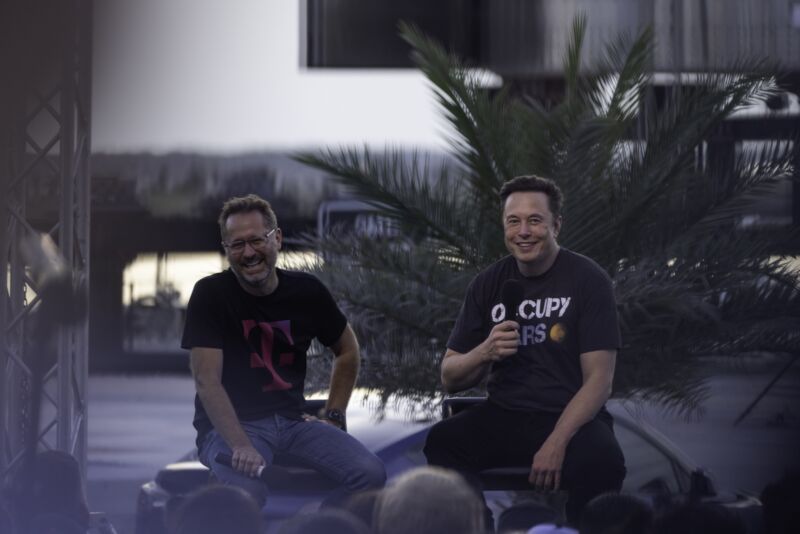

Starlink/T-Mobile plan for satellite-to-phone service to get boost from FCC
source link: https://arstechnica.com/tech-policy/2023/03/fcc-aims-to-help-starlink-t-mobile-and-others-connect-satellites-to-smartphones/
Go to the source link to view the article. You can view the picture content, updated content and better typesetting reading experience. If the link is broken, please click the button below to view the snapshot at that time.
Space-to-phone —
Starlink/T-Mobile plan for satellite-to-phone service to get boost from FCC
Low-Earth orbit satellites to serve phones in remote areas without cell coverage.
Jon Brodkin - 3/17/2023, 4:07 PM

The Federal Communications Commission says it wants to help satellite companies and mobile carriers partner up to close gaps in wireless networks. In a 4-0 vote, the FCC yesterday proposed "a new regulatory framework" designed to help satellite operators and wireless companies "leverage the growth in space-based services to connect smartphone users in remote, unserved, and underserved areas."
In August 2022, Starlink operator SpaceX and T-Mobile announced a plan to deliver space-to-ground service to mobile phones in areas not covered by T-Mobile's cellular network. SpaceX said this week that the companies plan to start testing the satellite-to-cell service sometime this year. Text messaging is expected to be the first supported service, with voice and Internet coverage to be added later.
The FCC said yesterday that "numerous such collaborations have launched recently, and the FCC seeks to establish clear and transparent processes to support supplemental coverage from space."
The FCC vote approved a Notice of Proposed Rulemaking (NPRM) that seeks public comment on a plan to regulate these collaborations and provide more access to spectrum needed to deliver the hybrid services. The NPRM "proposes a framework through which satellite operators collaborating with terrestrial service providers would be able to obtain FCC authorization to operate space stations on certain currently licensed, flexible-use spectrum allocated to terrestrial services," the FCC said.
The FCC also said it is "proposing to add a mobile-satellite service allocation on some terrestrial flexible-use bands." Operators of low-Earth orbit satellites, like Starlink, could "apply to access terrestrial spectrum if certain prerequisites are met, including a lease from the terrestrial licensee within a specified geographic area," the FCC said.
AdvertisementEmergency calls and texts in remote areas
If approved, a satellite operator "could then serve a wireless provider's customers should they need connectivity in remote areas, for example in the middle of the Chihuahuan Desert, Lake Michigan, the 100-Mile Wilderness, or the Uinta Mountains," the FCC said.
The FCC said it wants public comment on how the new regulatory framework can "best support access to emergency response systems like 911 and wireless emergency alerts when a consumer is connected via supplemental coverage from space." The agency is also looking for input "on whether the framework can be extended to other bands, locations, and applications that might be supported by such collaborations."
FCC Chairwoman Jessica Rosenworcel said the satellite/mobile collaborations initially may not provide high-speed broadband to phones. "But to start, they could deliver low-bandwidth connectivity suitable for emergency calls and texts in remote settings where terrestrial networks do not reach," she said.
Rosenworcel said new regulations are needed because "there are challenges with access to airwaves, frequencies that are not all globally aligned, possibilities for interference that must be managed, and standards work that could help grow these capabilities. But what is clear is that with the growing interest in the possibilities of convergence of satellite and terrestrial services, an ad-hoc, case-by-case approach to these new ventures is not enough."
Starlink/T-Mobile is one of several ventures
A draft of the NPRM released a few weeks before yesterday's vote pointed out several satellite-to-phone services that are in the works. SpaceX and T-Mobile are proposing to "use a block of T-Mobile's mid-band Personal Communication Services (PCS) spectrum held over a nationwide footprint," the FCC said. Last month, "SpaceX filed an application with the Commission detailing its proposed partnered service, including a request for authorization for SpaceX to use T-Mobile's PCS G block spectrum for 'direct-to-cellular' operations." The application includes several requests for waivers from the FCC's existing rules.
AdvertisementOutside the US, "Lynk Global has partnered with a number of mobile network operators (MNOs) around the world to enable their customers to send texts using Lynk's satellite network," the FCC said. "Like the SpaceX/T-Mobile proposal, Lynk has emphasized the public safety importance of this type of service during emergencies and natural disasters, such as hurricanes, wildfires, flooding, or earthquakes, which often cause the destruction of or damage to terrestrial mobile network equipment and resulting service outages."
Lynk also filed an application with the FCC and "has received Commission authority to test communications between satellites and mobile devices," the draft NPRM said.
Texas-based company AST SpaceMobile "deployed its test BlueWalker 3 satellite in November 2022, indicating its plans to develop a global network to provide service directly from its satellites to smartphones," the FCC said. AST filed applications to provide service in the US and "has partnered with several MNOs for its planned service, including AT&T and Vodafone, and the partnerships are described as being capable of bringing service to remote and 'off-grid' locations," the FCC said.
Though AST has applied for market access, "its current request is limited to frequencies for feeder links only, with no current request for direct-to-handset market access," the FCC said.
Bloomberg reported that the "FCC changed draft language that proposed barring the use of frequencies eyed for calls-via-satellite by AT&T and Midland, Texas-based startup AST SpaceMobile, and now seeks comments on allowing their use, agency staff said in a news conference. Those airwaves are assigned to FirstNet, a wireless network for public safety officials operated by AT&T. In filings, both AT&T and AST SpaceMobile had asked the FCC to allow direct-to-satellite service on the FirstNet airwaves, which are being used to test the service."
Recommend
About Joyk
Aggregate valuable and interesting links.
Joyk means Joy of geeK